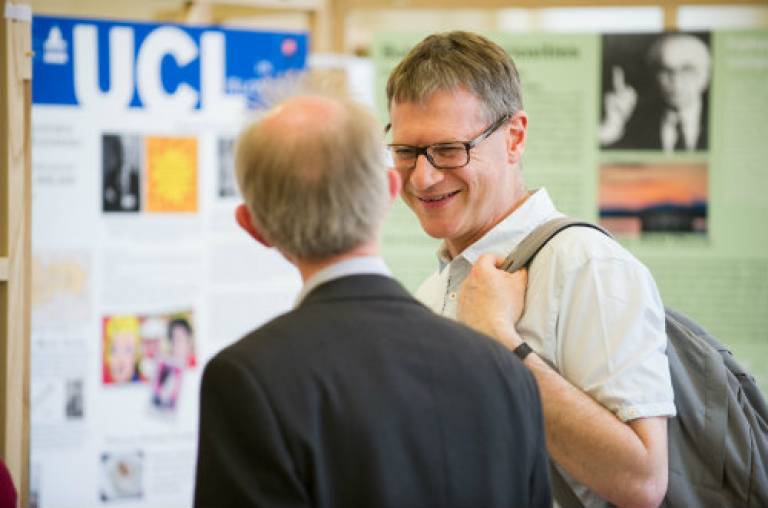5 things about the Scholarship of Teaching and Learning
14 July 2015

How can you bring together teaching, research and service within your academic role? Erik Blair (University of the West Indies) explored the question in a recent UCL Arena workshop.
1 What is the Scholarship of Teaching and Learning?
The Scholarship of Teaching and Learning (SoTL) is about approaching your teaching as if it were a research topic and finding new ways of doing things. In the same way academic research is about understanding the world through facts by gathering evidence and data to answer a posed question, your teaching can be reviewed in much the same way.
The workshop began with a timed task pouring liquid from two similar bottles to see which would be emptied the fastest. In the same way that this experiment was about trying two different techniques and testing them to see which was more effective, you can review the data produced by your teaching to come to a conclusion about which technique might work best for you.
Beginning this process is fairly simple; simply start by thinking about the way you teach and what you have noticed – are there things you would like to change or improve? As SoTL is about your personal pedagogy, it asks you to draw from your own experience to reflect on what matters to your teaching and learning audiences. How might what you do affect you, your students and others (even institutionally)?
As a growing field of research, you can then write this up and publish your findings to share with others.
2 What is the process?
The cycle of SoTL encourages reflexivity by asking you to investigate your pedagogical assumptions:
- Frame the question by identifying what you want to consider. (For example, it could be as simple as ‘why do I say ‘um’ when starting all my sentences?’)
- Gather and analyse evidence. (Look at what you are currently doing and see what needs improving or changing)
- Test and refine. (Try different techniques in the classroom)
- Make your results public. (Come to a conclusion and use it: then share with others through writing and publishing your findings)
3 How does it work in practice?
The workshop then considered the ‘big research questions’ for the topics of dance, DNA and then teaching and learning. Relaying these back to the larger group, it was clear they were all similar in scope: predominately ‘how’, ‘why’, and ‘what’ questions which focussed on the broad, specific, basic and complex aspects of the topics. Across the three subjects, the suggestions reflected personal perspectives and assumptions about that area.
Using this knowledge, the group then individually thought of a question which captured something they would like to investigate in their own teaching. In pairs this was then reviewed: was it specific enough? Could they collect the data in order to answer the question? And in gathering data, what will it answer? Does the method of data collection fit in with the resources available and each individual’s skills? What would be acceptable evidence in particular disciplines?
4 What are the alternatives?
Using the cycle of SoTL is not the only model available. Action Research provides another framework for thinking about teaching through its focus on finding a solution to a local problem in a local setting. It also encourages a cycle of continuous improvement, whereby the research doesn’t provide a right, wrong or definitive answer but rather provides more data for further reflection. It means you are able to keep trying to improve your teaching through exploring new ways of doing things.
The action model asks you to plan, act, observe and reflect. Similarly as with the cycle of SoTL, you start with the question or issues you would like to address with the aim to create new knowledge and understanding of the problem.
Neither is exclusive: you can choose to use the SoTL cycle or Action Research model or event a hybrid of both to plan your teaching and learning ‘research’ question.
5 Tips for using SoTL
- Start with what bothers you and formulate a question you would like to answer based on that.
- Work out what you are going to do and who it will impact (think of this group as active participants and not passive subjects).
- Identify what you need to find out, how you will gather the evidence and why you have picked the process (methods and methodology are both important).
- Before you start, work out how you will know if your SoTL will have any affect.
- Embrace reflection and reflexivity – both are important in the process.
- Publish your work but think about who you are making your results public to. Most likely the groups will be: immediate (you, students) institutional (department, faculty, university), national (government, educational bodies) and international (academy at large).
More information:
 Close
Close

